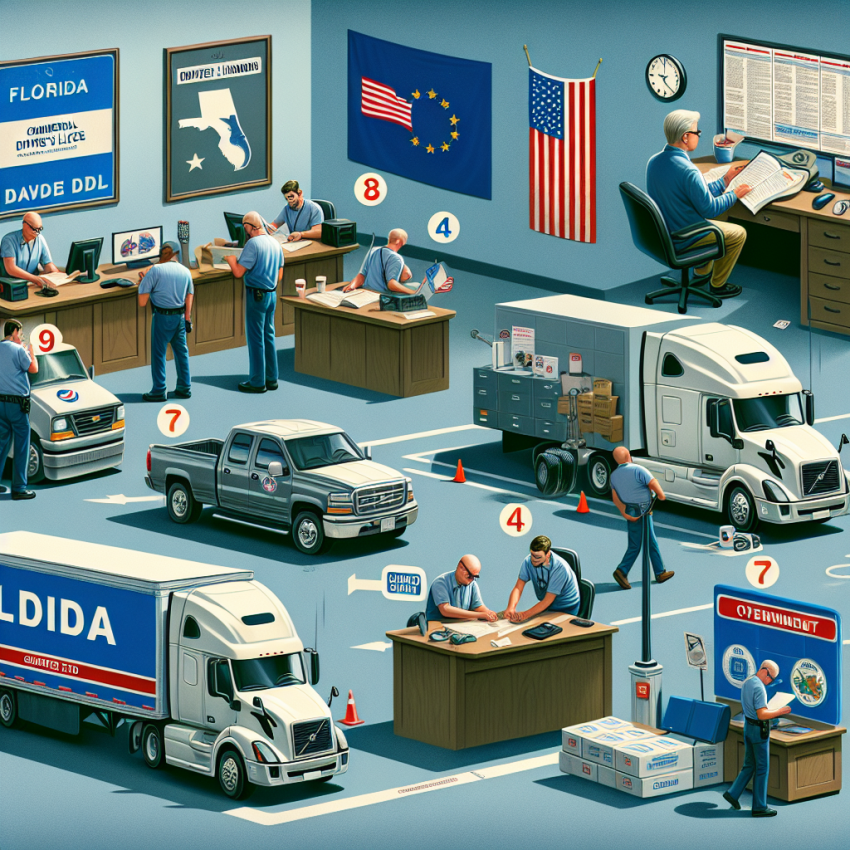Navigating the road to acquiring a Commercial Driver’s License (CDL) in Florida can be as tricky as steering a big rig through Miami’s bustling streets. Hopeful drivers face the common hurdle of understanding state-specific regulations and meeting stringent requirements. In this guide, we’ll map out the precise steps to ensure your journey towards a CDL is smooth and successful.
First, a stop at the Florida Department of Highway Safety and Motor Vehicles (FLHSMV) is mandatory. Here, you must obtain a Commercial Learner’s Permit (CLP). Then, embarking on behind-the-wheel training is crucial – but choosing an accredited program from the myriad options demands careful consideration. We’ll guide you through selecting a quality training provider, preparing for the CDL exam, and navigating the paperwork with efficiency.
Key Points for Obtaining a CDL in Florida
- Meet minimum requirements. Must be at least 18 years old. 21 for interstate.
- Hold a valid driver’s license. No recent major driving violations.
- Pass a DOT medical examination. Proves physical fitness for duty.
- Obtain a Commercial Learner’s Permit (CLP). Hold the CLP for 14 days before skills test.
- Complete CDL training. Not required, but highly recommended.
- Pass CDL skills test. Includes vehicle inspection, basic control, and road test.
- Provide necessary documentation. Social Security card, proof of residence, and more.
- Pay applicable fees. Varies by license class and endorsements.
Pros and Cons of Getting Your CDL in Florida
Pros
- Job opportunities. High demand for truck drivers.
- Increase in potential income. CDL holders often earn more.
- Favorable climate for training. Year-round good weather for practice.
- Diverse training options. Numerous schools and programs available.
Cons
- Time investment. Requires commitment to process.
- Upfront costs. Training and testing fees apply.
- Mandatory rest periods. Can impact long-haul schedules.
- Strict regulations. DUIs or felonies can disqualify applicants.
Understanding CDL Requirements in Florida
To get a commercial driver’s license (CDL) in Florida, applicants must meet certain criteria. First, one must be at least 18 years old to drive within state lines (intrastate) and 21 years old for interstate driving. A valid non-commercial driver’s license is also required. Moreover, the Federal Motor Carrier Safety Administration mandates that drivers pass a medical examination. This confirms that they can handle the physical demands of commercial driving.
Prospective drivers should also be aware of the background check process. Florida conducts checks on driving history and criminal background. An applicant’s driving record should be free of serious violations to ensure eligibility.
CDL Classifications and Endorsements
Florida offers several CDL classifications, each tailored to different vehicle types. Class A allows for the operation of trucks with a gross combination weight rating (GCWR) of 26,001 pounds or more. Class B is for single vehicles with a gross vehicle weight rating (GVWR) of 26,001 pounds or more. Class C covers vehicles designed to transport 16 or more passengers or hazardous materials.
In addition to classifications, drivers may obtain endorsements for added qualifications. For example, endorsements H and X allow for the transport of hazardous materials, T for double/triple trailers, P for passenger vehicles, and S for school buses. Achieving these requires extra testing on top of the general knowledge exam.
Navigating the CDL Application Process
Once you’ve met initial requirements, submit your application at a local Department of Highway Safety and Motor Vehicles (DHSMV). You’ll need to present various forms of identification, your social security number, and proof of residency. The application fee must be paid during this visit as well.
After submitting your application, you’re expected to take the CDL general knowledge exam and any applicable endorsement tests. These are multiple-choice exams administered by authorized testing centers throughout Florida.
Behind-the-Wheel Experience: Training & Testing
CDL training is an essential step towards safe and effective commercial driving. Though not legally mandated in Florida, many opt for professional training schools. These programs teach driving skills, road safety, and regulations.
After training, schedule a CDL skills test. This practical evaluation includes a pre-trip inspection, basic controls test, and on-road driving assessment. Passing this test proves your ability to safely operate a commercial vehicle.
Maintaining CDL Certification
Routine upkeep is key once you have a CDL. Stay updated on health assessments to maintain your medical certification status. Keep your driving record clean; traffic violations can affect your license status.
Continued education is also important. Regulations change over time, and it’s crucial to stay informed to ensure you adhere to all operational laws while driving commercially.
How Can You Prepare for Florida’s CDL Exam?
- Study the Florida CDL Handbook thoroughly.
- Take practice tests to familiarize yourself with the format and content.
- Join a reputable CDL training program.
- Gather all necessary documentation before applying.
- Schedule your written exam and skills test in advance.
Advancements in Acquiring Your Florida CDL
Acquiring a Commercial Driver’s License (CDL) in Florida incorporates technology for efficiency. Online resources offer study materials, allowing flexibility. Testing centers too use advanced systems to register and monitor exams.
The Florida Department of Highway Safety and Motor Vehicles (FLHSMV) has launched an online appointment system. This streamlines the scheduling process for both knowledge tests and skills tests. With less bureaucratic red tape, the path to obtaining a CDL is now more straightforward.
Customizing the CDL Process in Florida
Diverse career goals necessitate custom CDL training in Florida. Specialty endorsements like HazMat, tanker, or school buses require additional training modules. Various driving schools offer tailored programs, making sure each driver meets individualized professional ambitions.
Educational institutions adapt their offerings based on industry demands, ensuring drivers are well-equipped. They also help with the CDL application process specific to Florida’s guidelines, creating a tailored experience for applicants. Each journey to the Florida CDL is unique and catered to one’s needs.
Expert Advice for Navigating Florida’s CDL Requirements
Experienced drivers emphasize the importance of mastering the CDL manual. It’s the foundation of both the written and practical exams. Understanding its content is crucial.
Authorities in the field suggest thorough preparation for pre-trip inspections as part of the practical test. Familiarity with vehicle components and functionality can be decisive for success. They stress the value of hands-on practice besides theoretical learning.
Navigating Skills Test for Your Florida Commercial License
The CDL skills test in Florida is a pivotal step. It comprises a vehicle inspection test, basic controls test, and road test. Practicing with a similar vehicle that will be used on test day is recommended.
Pro tip: Schedule your test during off-peak hours if possible, to minimize stress from heavy traffic. Moreover, consider renting a vehicle from a local driving school familiar with testing routes and examiner expectations.
Can Leasing a Used Car in Florida Impact Your Ability to Get a CDL?
Leasing a used car in florida can indirectly impact your ability to get a CDL if financial obligations or credit issues arise from the lease. Ensuring steady financial health is essential, as CDL training and associated fees require focus and funding. Smart leasing decisions support stability while pursuing your commercial driving goals.
Maintaining Your Florida Professional Driving Credentials
Post-acquisition, staying current with regulations is key. Continuing education helps keep your knowledge fresh. Additionally, maintain your medical certificate and stay alert to renewal notifications from FLHSMV to avoid lapses in your licensure.
Avoid common violations that can affect your CDL status such as exceeding hour limits and maintaining logbook accuracy. Keep abreast of changes in transportation laws to ensure your CDL remains in good standing.
Keeping up with the latest Florida CDL requirements can be pivotal to your success as a commercial driver. From understanding the advancements to navigating each step meticulously, following this structured guide can enhance your journey toward gaining your credentials in Florida’s dynamic driving industry. Always engage with credible resources and heed advice from seasoned authorities to ensure you remain on the path to safe and compliant driving under the Floridian sun.
What are the basic requirements to obtain a CDL in Florida?
To qualify for a Commercial Driver’s License (CDL) in the Sunshine State, you must be at least 18 years old, have a valid social security number, and possess a Florida driver’s license. Out-of-state commercial licenses must be transferred.
Do I need any special education before getting a Florida CDL?
Yes, you must complete a mandatory Commercial Driver License Education course before taking the written exam. Training schools across Florida offer these courses.
What types of CDL can I get in Florida?
In Florida, you can apply for a Class A, B, or C CDL, each allowing you to operate different kinds of large or commercial vehicles depending on their gross weight and the nature of their cargo.
Are there any medical requirements for a Florida CDL?
Commercial driving applicants in Florida must pass a DOT physical examination to ensure they meet federal health guidelines for operating commercial vehicles safely.
How do I prepare for the CDL written test?
Preparation involves studying the Florida CDL Handbook which covers all potential test topics. It’s also recommended to take practice tests for better chances of success.
What does the CDL skills test include in Florida?
This practical test consists of a pre-trip inspection, basic vehicle control, and an on-road driving test, which assesses your ability to safely handle and navigate a commercial vehicle under various conditions.
Can I take the CDL tests in a language other than English?
The written tests are available in English and Spanish, but you must understand road signs and signals in English, and be able to converse with the authorities when needed.
How much does it cost to get a CDL in Florida?
Total costs may vary depending on the class of CDL and endorsements required. Generally, there is an application fee, plus additional charges for each endorsement and the skills test.
How long does it take to get a CDL in Florida?
The time frame varies based on individual preparedness and scheduling availability. After completing education, passing exams, and meeting all requirements, processing can generally be swift.
Can I use my personal vehicle for the CDL skills test in Florida?
You must provide the vehicle for the test, which should match the class of CDL you’re applying for and be in good operating condition. A rental vehicle is also acceptable if properly insured.
Final Thoughts
Acquiring your CDL in Florida unlocks opportunities in the transport sector with quality training programs designed to ensure road safety. The process is straightforward, supporting aspiring commercial drivers rigorously.
Earning a Florida CDL enables you to navigate not just Floridian highways but also diverse career paths. With dedication and proper guidance, securing this essential credential is an achievable goal for many.

